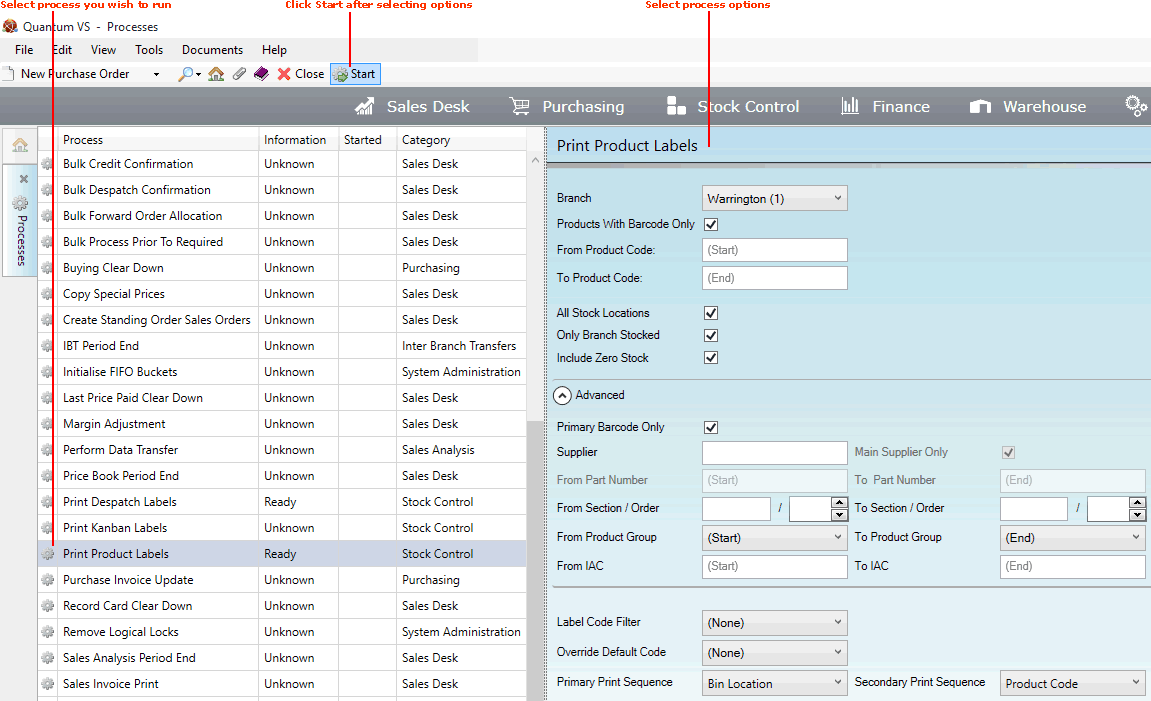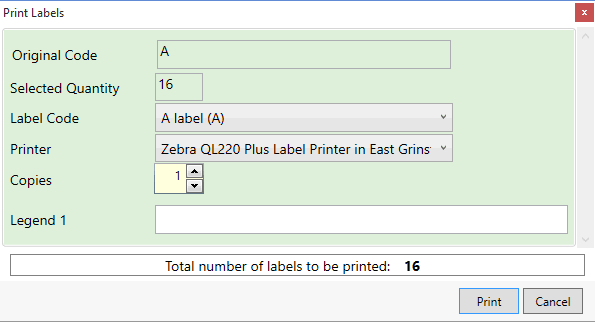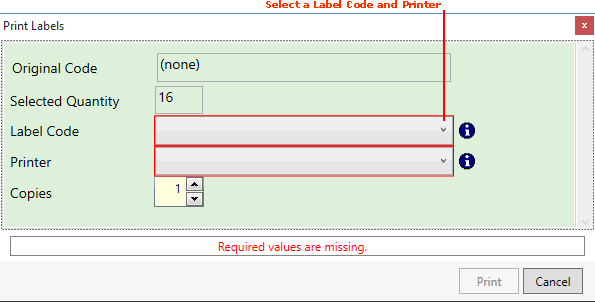From the Home tab: under links, select Processes.
|
Quantum VS Help: File Maintenance |
The Print Product Labels process will print a selected number of Product labels for a selected product range. These product labels may be attached to the product or to its stock location, batch or bin. There are numerous options for selecting and filtering the products and Label Types which will be printed.
Note: For an overview of label printing, including details of setting up label printing in Quantum VS, see Label Printing.
To run the Print Product Labels process:
1. Either:
From the Home tab: under links, select Processes.
Or: From the Toolbar - Main Menu: select Tools > Show Processes.
OR: Click the appropriate module on the Mega Menu then - under processes - select the required Process.
The Processes record opens in a new tab, listing all Processes by Name and Category.
2. Use your mouse or [Tab] key to select the Print Product Labels process:

3. Select main options in the available fields as required, using the following as a guide:
Note: You may use your [Tab] key to move from one field to the next.
|
Field |
Definition
|
|
Branch
|
Select the Branch label printing options will apply to. The User's Branch is selected by default, but you may select an alternative from the menu.
Note: Branch menu options are held in the table file B and must be defined using Branch Maintenance. |
|
Products With Barcode Only
|
Check this field to print labels only for (selected) products which have an associated Bar Code record.
Leaving this field unchecked means labels will be printed for all (selected) products, whether or not they have an associated Bar Code record.
|
|
From Product Code / To Product Code
|
To print labels for a:
Note: The options available in the Advanced fields below depend on whether you select a single product or a range.
If you don't know the Product Code you may enter it automatically using the Finder. To do this:
|
|
All Stock Locations
|
Select this option to print labels (for selected products) for all Batch Numbers and/or Bin Locations which apply.
If not selected, labels will be printed only for the first Batch Number and/or Bin Location found by the system, so that only one label is printed per product.
Note: This applies only to (selected) products flagged for 'batch traceability' via the Batch Trace, Multi Bin or Serial Number methods. |
|
Only Branch Stocked
|
Select this option to print labels for products stocked at the selected Branch only (i.e. exclude products not stocked at the selected Branch).
If not selected, labels will be printed for products stocked at all Branches, even if they are not stocked at the selected Branch.
|
|
Include Zero Stock
|
Select this option to print labels for selected products, whether their stock level is zero or greater than zero.
If not selected, products with zero stock will be excluded.
|
4. The Advanced section provides additional filtering options. Different fields are displayed, depending on whether you selected a product range or a single product above. Select options in the available fields, using the following as a guide:
|
Field |
Definition
|
|
Primary Barcode Only
|
If Primary Barcode Only is selected, printing of labels for the selected product range will be limited to the each product's Primary Bar Code.
If this option is not selected, printing of labels for the selected product range will apply to all of the products' applicable Bar Codes.
|
|
Supplier
|
You may limit label printing to products from a specified Supplier by entering the Supplier's Account Code here.
If you don't know the Supplier's Account Code you may enter it automatically using the Finder. To do this:
|
|
Main Supplier Only
|
Select this option to print labels for the product's Main Supplier only (i.e. exclude the product's Alternate 1 and Alternate 2 Supplier).
If not selected, labels will be printed for the product's Main, Alternate 1 and Alternate 2 Suppliers. See Entering Buying Details.
|
|
From / To Part Number
|
If you are filtering product label printing by a Supplier (see above), you may limit label printing to products with a specified Supplier Part Number or range of Supplier Part Numbers for the specified Supplier.
To print labels for a:
If you don't know the Supplier Part Number you may enter it automatically using the Finder. To do this:
|
|
From / To Section / Order
|
You may limit label printing to products with a specified Section Name / Section Order Code or range of Section Names / Section Order Codes.
To print labels for a:
Note: The Section Name is a sequence of up to five alphanumeric characters. This is followed by the Section Order Code, which is a sequence of up to five numerals. For example: PAINT00001. See Recording General Product Details. |
|
From / To Product Group
|
You may limit label printing to products from a specified Product Group or range of Product Groups.
To print labels for a:
|
|
From / To IAC
|
You may limit label printing to products with a specified IAC (Initial Access Code) or range of Initial Access Codes.
To print labels for a:
Note: The IAC (Initial Access Code) Section Name is a sequence of up to 30 alphanumeric characters and can be used as an alternative to the product code. See Recording General Product Details. |
|
Field |
Definition
|
|
Barcode
|
If required you may limit printing of labels for the selected product to a selected 'our' Bar Code by entering it here.
If you don't know the Product's Bar Code you may enter it automatically using the Finder. To do this:
Note: 'Our' Bar Code records are set up and maintained in Bar Code Record Maintenance. |
|
Primary Barcode Only
|
If no Bar Code is selected (above) and Primary Barcode Only is selected, printing of labels for the selected product will be limited to the product's Primary Bar Code.
If this option is not selected, printing of labels for the selected product will apply to all of the product's applicable Bar Codes.
|
|
From / To Batch Number AND From / To Bin Location
|
To print labels for a:
If you don't know the Product's Batch Number(s) or Bin Location(s) you may enter it automatically using the Finder. To do this:
Note: This options are available only for (selected) products flagged for 'batch traceability' via the Batch Trace, Multi Bin or Serial Number methods. |
5. By default, for each product in the range selected, the system will use the default Label Type specified for the product. If multiple Label types have been set up on your system and associated with different products, it is possible that multiple Label Types will be used for printing labels for your selected products.
Note: Products are associated with a default Label Type via the Label Code field in the Bar Code record for the product - see Creating A New Bar Code Record.
However, you may choose to override or limit the Label Types selected by the system when printing product labels using the following options:
|
Field |
Definition
|
|
Label Code Filter
|
If required, you may filter the Label Types to be printed by selecting an option from the menu (i.e. exclude labels not of the selected type from being printed).
If you select (None), all Label Types - as specified by the system based on your selection criteria - will be printed.
|
|
Override Default Code |
If required, you may override the Label Types to be printed by selecting an option from the menu (i.e. make all product labels to be printed use this Label Type).
If you select (None), the system will use the Label Type associated with each selected product.
|
|
Note: The Label Types (i.e. Label Description and Code) available in the above menus are set up in Label Maintenance. See Creating A New Label Record. |
|
To understand the difference between the above options, consider the following example. Based on our selection criteria we will be printing labels for 80 products. For simplicity we will assume one label per product will be printed.
Each product may be assigned a default Label Type. Assume that, for our 80 products, the default Label Types to be used are as follows:
|
Label Type |
Number of selected products associated with this Label Type
|
|
A
|
34 |
|
B
|
20 |
|
C
|
26 |
|
Total
|
80 |
If, rather than accepting the defaults, we were to select option A from the:
Label Code Filter field: 34 labels of Label Type A only will be printed (i.e. Label Types B and C would be excluded).
Alternatively, if, rather than accepting the defaults, we were to select option A from the:
Override Default Code field: 80 labels of Label Type A only will be printed (i.e. all products selected for printing will use Label Type A).
6. Select the Primary Print Sequence and Primary Print Sequence in the available fields. The available options are:
Bin Location
Barcode
Product Code
IAC
Product Group
Section / Order
Part Number (if a Supplier has been selected)
For example, the default options are Primary Print Sequence - Bin Location and Secondary Print Sequence - Product Code. Therefore, product labels will be printed in Bin Location order. Within each Bin Location, product labels will be in Product Group order.
7. Click Start on the Toolbar - Sub Menu to begin running the process.
8. The Print Labels window displays, showing the default Label type(s) for the selected product or product range. You may now specify further options or accept the displayed default options.
Note: The default Label Code selected for each product is defined in the Label Code field in the Bar Code record for the product. See Creating A New Bar Code Record.
For example:

The fields displayed - and options available - are as follows:
Note: In the above example, the system has selected only one Label Type - A - for the product range we have selected to print labels for. Potentially multiple Label Types may be displayed, although the available options for each Label Type are the same.
|
Field |
Definition
|
|
Original Code
|
The Label Type selected to be printed (based on the entered criteria).
In the example above, all 16 of the products selected for label printing are associated with the Label Type 'A'.
|
|
Selected Quantity
|
The quantity of this Label Type selected to be printed (based on the entered criteria).
In the example above, 16 labels are due to be printed of the Label Type 'A'.
|
|
Label Code
|
The current selected Label Type to be printed (showing Label Code and Description).
This is initially the same as the Original Code. However, you may assign a different Label Type by selecting an option from the menu.
In the example above, all 16 of the products selected for label printing are associated with the Label Type 'A'. If you decided you would prefer to use the Label Type 'B' instead of 'A', you would select this option from the menu.
|
|
Printer
|
The default Printer to be used for this Label Type, as defined in the Label record.
You may select an alternative from the menu as necessary.
|
|
Copies
|
The number of copies of this Label Type to be printed. This defaults to 1, but you may select an alternative.
For example, if you required 2 of each label you would alter the number of Copies to 2.
Note: Setting the Copies quantity to zero means that none of this Label Type will be printed. |
|
'Legend' Fields
|
Up to five 'Legend' fields may be displayed. These are User-definable and specified in the Label record for each Label Type.
For each 'Legend' field displayed, you may enter a value which will be printed on the label.
For example, if this Label Type had the 'Legend' field 'Warehouse Name', you might enter the name of the warehouse in the available field. This would then be printed on each label for this Label Type.
|
The Total number of labels to be printed displays at the bottom of the Print Labels window.
If products selected for label printing have not been associated with a default Label Type they are listed in the Print Labels window with the Original Code (None) and the Print option is disabled.
To enable printing of these labels you will need to assign the Label Code and Printer to be used:

Alternatively you may enable printing by amending the number of Copies to zero.
Another option is to go back and associate the products with a default Label Type (via the Label Code field in the Bar Code record for the product - see Creating A New Bar Code Record) then resume Product Label Printing with the same criteria as before.
9. When you have finished, click Print. The specified label(s) will be printed using the specified printer(s).
10. When the process has finished running, a Status message will be shown. Click OK to close this message. You may now close the Processes tab if you wish.